- Home
- Elif Shafak
Black Milk Page 4
Black Milk Read online
Page 4
Just then, out of the blue, Ms. Agaoglu catches me off guard by broaching a new topic. “I think at some point in their lives, women writers feel like they have to make a choice,” she says. “At least that is what happened to me. I decided not to have children in order to dedicate myself to writing.”
She tells me, in a voice calm but firm, that to be able to stand on her feet as a woman novelist and to write freely and copiously, she chose not to have any children of her own.
“I was lucky,” she says, “because my husband backed me in this difficult decision. There is no way I could have done it without his support.”
My stomach clenches. Please don’t ask me. But she does.
“How about you? Is motherhood something you are considering?” The manifesto I penned on the steamboat flashes in front of my eyes in gaudy capital letters. This might be the right time to recite some parts of it. But before I get a chance, the Choir of Discordant Voices begins to sing, as if an on button has been pressed.
“Shhh, be quiet,” I whisper into my collar. “Shut up, girls, for God’s sake.”
“Did you say something?” Ms. Agaoglu asks.
“No, no… I mean, yes, but I was just murmuring to myself… It’s nothing really…” I say, feeling the color rush to my face.
“And what were you murmuring to yourself?” Ms. Agaoglu asks, not letting me off the hook.
I swallow so hard that we both hear the gulp go down my throat. I dare not say: “I was just reprimanding the four women inside me. You see, they hold opposing views on motherhood, as with all the important topics in my life.”
I dare not say: “There is a mini harem deep down in my soul. A gang of females who constantly fight for nothing and bicker, looking for an opportunity to trip one another up. They are teeny-tiny creatures, each no taller than Thumbelina. Around four to five inches in height, ten to fourteen ounces in weight, that is how big they are. They make my life miserable and yet I don’t know how to live without them. They can come out or stay put as they like. Each has declared a different corner of my soul her residence. I cannot mention them to anyone. If I did they would have me institutionalized for schizophrenia. But isn’t the personality schizophrenic by definition?”
I dare not say: “Each member of the Choir of Discordant Voices claims to be the real me and therefore sees the others as rivals. So deep is their distaste of one another, if given a chance, they would scratch one another’s eyes out. They are flesh-and-blood sisters but they function under Sultan Fatih’s Code of Law. [3] Should one of them ascend to the throne, I am afraid the first thing she would do would be to get rid of her siblings once and for all.
“Chronologically speaking, I don’t know which finger-sized woman came first and who followed whom. Some of them sound wiser than others but that is less because of their ages than because of their temperaments. I guess I got used to hearing them quarrel inside my mind all the time.”
I dare not say any of this. Instead I throw a question into the fray, taking the easy way out:
“Tell me, Ms. Agaoglu, if Shakespeare had a sister who was a very talented writer or if Fuzuli had a sister who happened to be a poet as gifted as he was, what would have happened to those women? Would they write books or would they raise children? I guess what I am wondering is, could they have done both?”
“That is a question I have tackled long ago…” she says, her voice trailing off. “The answer I came up with was a clear no. But now, my dear, it is your turn to answer. Do you think a woman could manage motherhood and a career at the same time and equally well?”
A Talented Sister
In A Room of One’s Own, Virginia Woolf makes the claim that it would have been impossible for a woman, any woman, to write the plays of Shakespeare during his age. To clarify her point she brings up an imaginary woman whom she introduces as Shakespeare’s sister. She names her Judith.
Let’s assume for a moment that this Judith was as passionate about theater as Shakespeare was, and just as gifted. What would have been her fate? Could she have dedicated her life to developing her talent like Shakespeare had done? Not even a chance, says Woolf.
The answer is no because a different set of rules holds for men than for women. Judith can be as talented as she likes, as fond of art and literature as she likes, but her path as a writer will be strewn with obstacles, small and large. She will have a hard time finding wiggle room in the “sociable-wife, meticulous-housewife, faithful-mother” box she is expected to fit into. More important, between her womanly tasks and motherly roles, she will not be able to find the time to write. Her whole day will pass with household chores, cooking, ironing, taking care of the children, shopping for groceries, tending to her familial responsibilities… and before she knows it, she will become a Sieve Woman, all the time in the world leaking through the holes in her life. In those rare moments when she finds herself alone, she will give in to exhaustion or frustration. How will she write? When will she write?
From the very beginning, the opportunities presented to Shakespeare will be barred from Judith. In this world where girls are discouraged from developing their individuality and are taught that their primary role in life is to be a good wife and mother, where women are vocal in the realm of oral culture but mostly invisible when it comes to written culture, women writers start the game down 7-0.
Let us now apply Virginia Woolf’s critical question to the Middle East.
Fuzuli was one of the greatest voices of the Orient, a renowned sixteenth-century poet highly respected today by Arabs, Persians and Turks alike. Let’s say Fuzuli had a talented younger sister-he very well may have had one-and her name was Firuze, meaning “turquoise,” the color of her eyes.
This Firuze is a whiz kid, an explorer by nature, bent on learning, bubbling with ideas. Her hair is curly, her smile dimply and her mind is full of questions, each tailing the next one. Like images in opposite mirrors, her ideas multiply endlessly, extending into infinite space. Imagination flows out of her sentences like water through the arches of an aqueduct, always fresh, always free.
She loves stories, the more adventurous and dangerous the better. Day and night she spins stories about pirates carrying human skulls with rubies set into their eye sockets, magic carpets that fly over spice bazaars and crystal palaces, and two-headed green giants who speak a language alien to all ears but hers. She endlessly tells these tales to her mother, grandmother and aunts. When they can listen no more, she relates them to guests, servants and whoever else should come calling.
The elders in the family shake their heads in unison and say, “Girl, you have an imagination deeper than the oceans. How do you come up with all these stories? Do you sneak up to the peak of the Kaf Mountain in your sleep and eavesdrop on the talks of the fairies till morning breaks?”
Firuze wonders what kind of a place is this Kaf Mountain. How she would love to go there and see it with her own eyes. The world is full of wonders, and there are some corners of Earth that remind you of paradise; this she knows not through experience but through intuition. She has read the verses about paradise in the Qur’an where it says, “Those who are accepted into heaven will be adorned with golden bracelets and be given clothing made of the finest green silk.” One of her favorite pastimes is to close her eyes and imagine herself donned in fine silks, jangling crafted bells on her ankles as she walks by streams of the coolest waters, picking juicy fruits from the trees, each bigger than an ostrich egg.
Dream is a rosy-cheeked lass, as charming as a water nymph, and just as playful. If you attempt to hold her in your arms, she will slip out of your grip, lithe and nimble, like a fish, like the mirage she is. Those who crave her touch only wear themselves out.
Reality is a crone with hair as gray as stormy skies, a toothless mouth and a chilling cackle. She is not ugly, not really, but there is something disturbing about her that makes it difficult to look her in the eye.
Dream is Firuze’s bosom buddy, her best friend. While they play, la
ughing and joking as they skip about, Reality watches them from a distance with eyes narrowed to slits.
“Someday soon,” says Reality, “that spoiled Dream will be out the door and I will languish in that throne of hers. Firuze can play with Dream for a while longer. But she’ll be a woman soon and then she’ll have to part ways with that adored playmate of hers.”
One morning Firuze wakes up with a strange wetness between her legs and a red blotch smeared upon her nightgown. Her heart skips a beat. She fears she has cut herself on something. Sobbing, she runs to her mother. But no sooner has she said a few words than she receives a whopping slap.
“Be quiet,” says her mother, the tenderness in her gaze not matching the sharpness in her tone.
“But what is going on, Mother?” asks Firuze in a horrified whisper.
“It happens to all women,” replies her mother. “Just don’t tell anyone about it, especially your brothers. Here, take these cloths and go clean yourself.”
“It happens to all women,” Firuze repeats incredulously.
“That is right, and it means you are not a girl anymore. From now on you have to watch how you behave. You cannot run around or skip rope. You cannot talk loudly or giggle. You are a woman now.”
When? Why? How did she switch from girlhood to womanhood? She had always thought becoming a woman was like walking a long, winding road with trees on each side, learning your way step by step. Why had no one told her that it was, in fact, a trapdoor you stepped on and tumbled into without knowing it was there?
Firuze feels dirty and guilty, not due to something she has done, but due to what she is. Her grandmother tells her not to touch the Qur’an until her bleeding has stopped and she has thoroughly cleansed herself. It seems even God doesn’t want her anymore.
Firuze feels hurt. The color goes from her face, the smile from her eyes. That carefree girl whose laughter echoed in the house like a dozen tinkling bells is now replaced by a woman whose body weighs down on her. Her head bent low, her face clouded by thoughts, Firuze is in a foreign land even as she sits by the brazier with Reality.
The elders of the family do not take their eyes off her, whispering among themselves about possible suitors. Matchmakers come and go, bearing lokum wrapped in silk handkerchiefs. As her parents haggle for her bridal price, it becomes ever more important that Firuze be modest. But no matter how strictly they supervise her, they can’t stop her from running up to the second floor and pressing her nose into the latticed windows. She stays there until the holes leave marks on her face like chicken pox, inhaling the smell of the wild herbs carried by the wind from the valleys afar.
If only she could walk out of the house and find a caravan that would take her beyond the city of Karbala to the ends of the world. She wants to go to school like her brother Fuzuli, and study theology, tafsir [4], astronomy and alchemy. If only she could walk along the streets proudly carrying books and brick-thick dictionaries under her arms. If only her parents would say, “Well done, Firuze. May you become a great poet like your brother, God willing!”
Firuze has a secret she won’t reveal to anyone: For years now she has been writing poems. In the beginning she used to scribble down whatever was weighing on her heart, without any expectations, as if talking to herself. Before long she realized that this, to her, was more than a pastime. It was a passion.
Her writing progresses like an illness that has infected and invaded her body and soul. More often than not, inspiration comes at dawn. She rises before the morning breaks, puts a shawl on her thin shoulders and starts to write. Those who hear the soft tinkering from her room think she has risen to pray. They don’t know that in a way she has. Poetry to her is true prayer, rising from the depths of her soul, addressed to a force far higher and mightier. If there were no poetry, Firuze believes, God would be too lonely.
She reads the works of other poets, especially the Iranian Hafiz and the Turkish Nesimi. She also adores her brother’s poems, one of which she came across today and instantly memorized:
All that is in the world is love
And knowledge is nothing but gossip
Though she loved the poem she couldn’t help thinking that only a man who had been well educated and versed in grammar and language could make such a statement. For Firuze, and all who had been excluded from school, knowledge was surely much more than gossip.
It was burning thirst.
There is an aged concubine, a woman with skin darker than ebony, who has been taking care of Firuze since the day she was born. When she walks she glides across the room as silent as silk; when she talks, she does so in whispers. One morning while crocheting a lace bedspread together, Firuze turns to her nanny and says, “I want to go to the madrassa [5] and be a famous poet.”
“Is that so?” The nanny chuckles, her large breasts jiggling.
“Why are you laughing?” says Firuze, sounding hurt.
“Allow me to tell you a story first,” the nanny says, suddenly serious again.
And this is the story she tells: One day Nasreddin Hodja was working in a watermelon patch when he stopped for a break and sat under a walnut tree. Looking up, he murmured to himself, “God Almighty, I don’t understand Your ways. Why on earth did You grow huge watermelons on the thinnest stems and put those tiny little walnuts on those thick branches? Wouldn’t it have been better the other way around?”
Just as he finished speaking a strong wind blew and a walnut fell down from the tree, falling square on his head.
“Ouch!” Nasreddin Hodja yelled in pain. As he massaged his bruised head, he understood his mistake. “God forgive me and my silly tongue,” he said. “Now I understand why You didn’t place watermelons on a tree. If Thou had replaced watermelons for walnuts, I wouldn’t be alive now. Keep everything in its place, please. You know better!”
Firuze listens, hardly breathing. “What’s that got to do with me?”
“Crazy girl, don’t you see?” the nanny asks. “Who has ever heard of a female poet? There is a reason why God made everything as it is and we’d better respect that reason, lest we want watermelons raining on our heads.”
That afternoon Firuze walks into the backyard. She walks past the well straight to the hen coop in the corner. Opening the small wooden gate, she enters, inhaling the pungent smell of earth, dust and dirt. Neither the rooster nor the chickens pay attention to her. The hen coop is her room. This place, with its sharp odor and noisy residents, is her only breathing space.
Under the feeding bowls, inside a velvet box, she keeps her poems. Cleaning off the dust, she grabs the box and goes to see her brother.
“Hey, little sister, what are you doing?” Fuzuli says, surprised to see her standing by the door.
She hands her poems to him, the smile on her face as tight as an oud string. “Read them, will you?”
He does. Time slows down and moves to a different rhythm, like a sleepwalker. After what seems like an eternity, Fuzuli lifts his head, a new flicker in his eyes that wasn’t there before.
“Where did you find these poems?” he asks.
Firuze’s eyes flicker away from his face. She dares not say the truth. Besides, she wants to know whether her poems are any good. Does she really have talent?
“One of the neighbors came calling the other day. The poems belong to her son,” she says. “She implored you to take a look at them, and tell her, in all honesty, if her son has any talent.”
A shadow crosses Fuzuli’s face as if he were suspicious but when he speaks his voice is calm and assuring. “Tell that neighbor her son should come and see me. This young man has a great talent,” he says, stroking his long, brown beard.
Firuze is alight with joy. She plans to tell her brother the truth when the right moment comes along. If she can convince her brother, he can convince the whole family. They will understand how much words mean to her. Believing in poetry is believing in love. Believing in poetry is believing in God. How can anybody say no to that?
But the
moment she waits for never comes. Only weeks after their conversation, Firuze is married off to a clerk eighteen years her senior.
With drums and tambourines they sing on her henna night. The women first dance and laugh with joy, then their faces crumble, awash with salty tears. On wedding days at the celebrations of women, and only then and there, happiness and sorrow become two different names for the same thing.
Yesterday she was a child/swimming in a sea of letters/she bled poetry
A stain grew on her nightgown/dark and mysterious
In a heartbeat/in a blink/she became a woman
Her name a forbidden fruit…
Due to her husband’s connections, it is decided that the couple shall settle down in Istanbul. Firuze is swept away from her home, her family and her childhood. As she leaves her house, she does not pay a last visit to the hen coop. She doesn’t care. Not anymore. Hidden in a hole under the feeding bowls, her poems go to waste. Her big secret turns to dust and the dust is swept away.
Months later in Istanbul, Firuze sits in a konak by the Bosphorus watching the dark indigo waters. She gags but manages not to throw up this time, being seven weeks into her pregnancy. She hopes it will be a son to carry her husband’s name across generations and to the ends of the Earth. Sometimes she utters poems but she doesn’t write them down anymore. The words she breathes disperse in the wind like shards of a broken dream she once had but can no longer remember.
Who knows how many women like Firuze lived throughout Middle Eastern history? Women who could have become poets or writers, but weren’t allowed… Women who hid their masterpieces in hen coops or dowry chests, where they rotted away. Many years later, while telling stories to their granddaughters, one of them might say,
“Once upon a time I used to write poems. Did you know that?”
“What is that, Grandma?”
“Poetry? It is a magical place beyond the Kaf Mountain.”

 Black Milk: On Writing, Motherhood, and the Harem Within
Black Milk: On Writing, Motherhood, and the Harem Within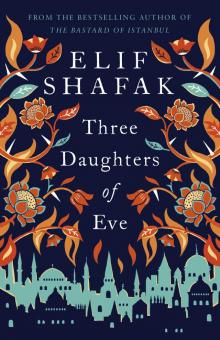 Three Daughters of Eve
Three Daughters of Eve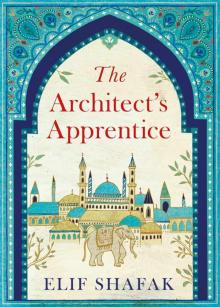 The Architect's Apprentice
The Architect's Apprentice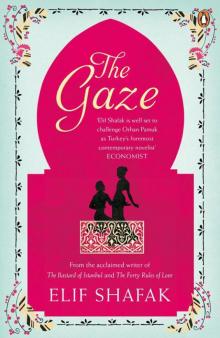 The Gaze
The Gaze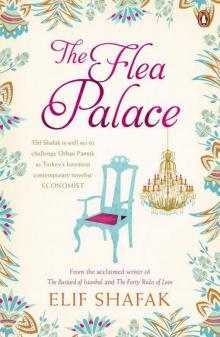 The Flea Palace
The Flea Palace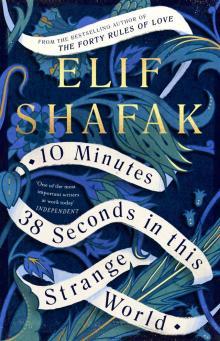 10 Minutes 38 Seconds in this Strange World
10 Minutes 38 Seconds in this Strange World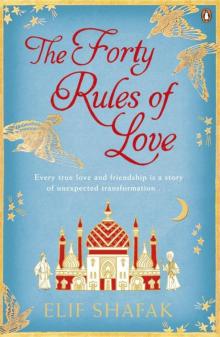 The Forty Rules of Love
The Forty Rules of Love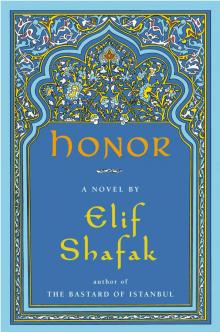 Honor
Honor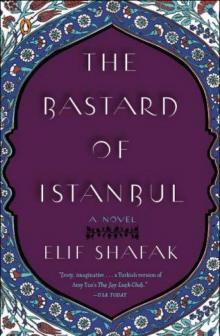 The Bastard of Istanbul
The Bastard of Istanbul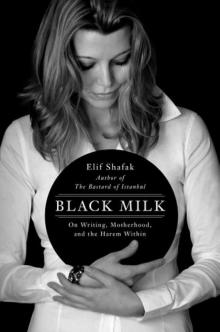 Black Milk
Black Milk The Happiness of Blond People (Penguin Specials)
The Happiness of Blond People (Penguin Specials)